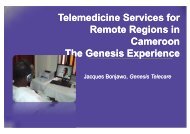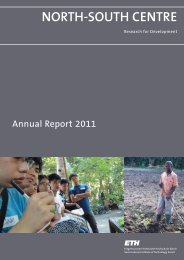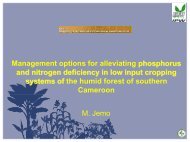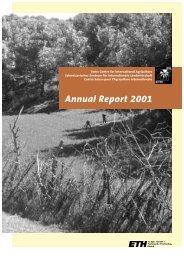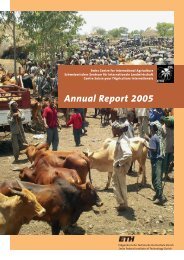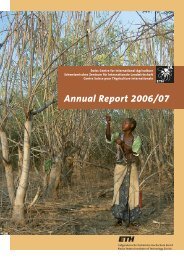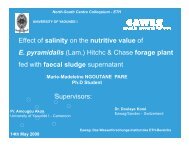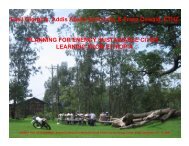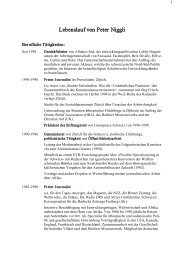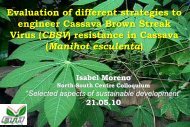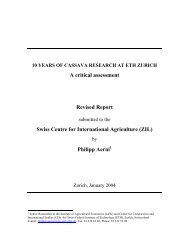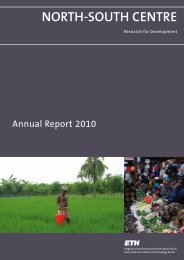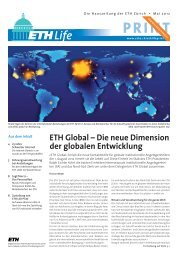NORTH-SOUTH CENTRE - ETH - North-South Centre North-South ...
NORTH-SOUTH CENTRE - ETH - North-South Centre North-South ...
NORTH-SOUTH CENTRE - ETH - North-South Centre North-South ...
You also want an ePaper? Increase the reach of your titles
YUMPU automatically turns print PDFs into web optimized ePapers that Google loves.
Urban Laboratory – Addis Ababa<br />
Actor networks in sustainable urban and rural transformation<br />
The Urban Laboratory – Addis Ababa is as multifaceted as<br />
the assemblage of people that has contributed to its genesis.<br />
As many endeavors, it all began with a dinner. Franz<br />
Oswald, our colleague and guest, had just returned from<br />
Ethiopia and recalled with excitement what he had seen<br />
and experienced. He talked of places and people, not unlike<br />
Marco Polo’s narration in Italo Calvino’s Invisible Cities,<br />
that set to coalesce into a montage of fragmentary images:<br />
the roof of Africa, the “new flower” of Addis, the Queen of<br />
Sheba, Emperor Menelik II, and so forth. But he also addressed<br />
the conditions that frame current developments in<br />
Ethiopia: widespread poverty, the AIDS epidemic, insufficient<br />
sanitation, contested elections, migration from rural<br />
to urban regions, and the increased role of China in Africa.<br />
Little did we know that this would be just the beginning of<br />
myriad expeditions, not only into foreign terrains but also<br />
into the very culture that we call our own.<br />
Alternative project for affordable mass housing and urban<br />
agriculture in Addis Ababa, combining pre-fabrication<br />
and self-built construction (Sarah Graham 2009/2010)<br />
Oswald, arguing for understanding the city as a collection<br />
of intertwined networks, became the first actor in a complex<br />
net of participants who temporarily joined forces to<br />
form ad hoc groups linked by a common project. With this,<br />
the Urban Laboratory – Addis Ababa was founded to address<br />
questions pertaining to Ethiopia’s current urban and rural<br />
transformation – a laboratory to combine expertise from a<br />
range of fields, via research and integrated design processes,<br />
in order to promote strategies for achieving sustainable<br />
settlements. What began as a partnership linking faculty<br />
and students from Addis Ababa University and the <strong>ETH</strong> Zurich<br />
soon evolved into a network of collaborators that included<br />
city officials, professionals, and local stakeholders, for<br />
any potential change could only be initiated from within.<br />
Here, urban design as a discipline became the central platform<br />
in processes of mediation. The design propositions that<br />
emerged from the research – whether pertaining to infrastructure<br />
planning, to slum up-grading, or the formation of<br />
new towns in rural territories – offered a base for dialogue,<br />
a type of round-table for debates where ideas could be<br />
bartered and conflicts possibly resolved. A recent exhibition<br />
of the work in Addis Ababa combined with a series of workshops<br />
took on the role of a participatory forum, with urban<br />
design as an agent tracing connections between controversies,<br />
unraveling disagreements, and setting potential courses<br />
of action for Ethiopia’s urban and rural transformation –<br />
urban design as a form of communicative action.<br />
Marc Angélil and Dirk Hebel<br />
Marc Angélil is Professor of Architecture and Design in the Network<br />
City and Landscape (NSL) of the Department of Architecture of<br />
the <strong>ETH</strong> Zurich. Dirk Hebel is Director of the Ethiopian Institute of<br />
Architecture, Building Construction and City Development at Addis<br />
Ababa University.<br />
Their book Cities of Change Addis Ababa: Transformation Strategies<br />
for Urban Territories in the 21 st Century has been published by Birkhäuser<br />
Verlag in 2009.<br />
49<br />
Research collaboration<br />
Urban and rural transformation



